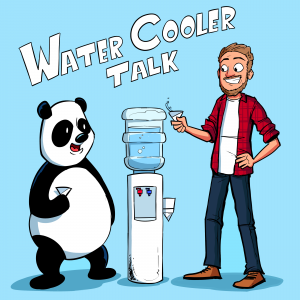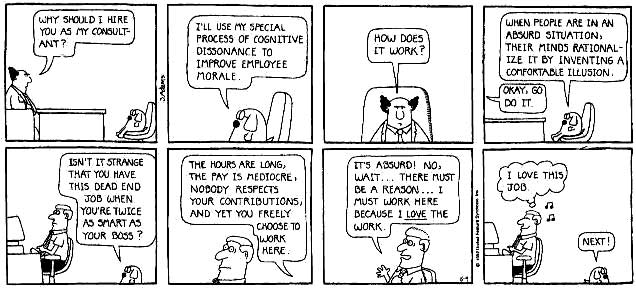Self-Defining Attitudes
The greatest deception humans suffer is from their own opinions. — Leonardo da Vinci
 Today’s post complements research I recently discussed on the podcast, Water Cooler Talk Podcast, where I applied psychological research to why people continue to resist wearing masks, why people avoid facts that could be helpful, and other (fascinating!) topics.
Today’s post complements research I recently discussed on the podcast, Water Cooler Talk Podcast, where I applied psychological research to why people continue to resist wearing masks, why people avoid facts that could be helpful, and other (fascinating!) topics.
Here’s a quick clip if you want a teaser of the interview.
So, if you need to do some chores, travel somewhere, or just feel like sitting and listening, I highly recommend checking out the full interview — which you can find here in multiple formats.
Although today’s post will expand on some of the topics discussed in that interview, it will also provide useful and interesting information for anyone reading today!
SELF-DEFINING ATTITUDES
In the podcast, one of our primary discussion topics is why people continue to resist wearing masks. And in it, I talk about a concept that I and my colleagues, Pete Zunick and Russ Fazio, published research on a few year ago: self-defining attitudes.
People’s attitudes are essentially whether they like or dislike something. For example, you may have a positive attitude toward coconut-milk ice cream (you like it!) or a negative attitude toward Midwest humidity (you dislike it!). Any positive or negative reaction like this that you have toward a topic would represent your “attitude” toward that topic.

For example, I have positive attitudes toward the video games World of Warcraft and Overwatch. However, only for World of Warcraft does my positivity toward it say something to myself and others about “who I am.” Or in other words, I consider my positive attitude here to reflect attributes, qualities, memories, etc. that help define my sense of self.
Thus, when it comes to wearing masks, people might not only have positive or negative attitudes toward them. That positivity/negativity might also be self-defining. And in our research on this topic, we discovered some interesting things.
SELF-DEFINING…MASKS?
First, positive (vs. negative) attitudes are more likely to be self-defining attitudes. Or in other words, we’re more likely to define ourselves by what we like than by what we dislike. Thus, when it comes to mask wearing, pro-mask people probably treat it as a self-defining attitude, whereas anti-mask people are probably less likely to view it as such.

Second, we found that if you threaten someone’s self-defining attitude, they are more likely to double-down on that attitude.
In one study, I and my colleagues essentially “tricked” participants into thinking they were either good or bad environmentalists. That is, we gave them a biased questionnaire that either made it easy to indicate they were good environmentalists (e.g., True or False: “If the situation allows for it, I recycle”) or difficult to indicate they were good environmentalists (e.g., True or False: “No matter the situation, I recycle”).
After answer 20 or so of these questions, participants were either led to perceive themselves as good environmentalists or bad ones. And afterward, we offered participants the opportunity to say something about environmentalism more broadly.
Interestingly, for people whose environmentalism attitude was not self-defining but still highly positive, our manipulation didn’t really have much effect.
However, for people whose environmentalism attitude was self-defining, having their attitude “threatened” led them to be much more likely to exclaim something about their attitude on the topic. Thus, when someone with a self-defining attitude has that attitude “attacked” in some way, they are much more likely to be expressive about it!
THE SELF GETS THREATENED

When it comes to the mask debate, it is no longer just about whether it is good or bad to wear a mask (though, as an aside, lots of research shows it is very good to wear one). Instead, the debate has turned to critiques about the people themselves, rather than just their attitudes.
Thus, when pro- and/or anti-mask wearers get challenged for their beliefs, because it has become a self-defining topic, they are likely to double-down on their stance rather than engage with others’ perspectives on it.
So, if you’re trying to convince someone to start wearing a mask, it can be better to discuss attitudes surrounding the topic (e.g., the safety of others, the pandemic itself, etc.) rather than their attitude on mask-wearing specifically.
Self-Definingly,
jdt
Everyday Psychology: How might today’s concept apply to other opinions and beliefs? For example, what are some other topics in your life that are self-defining for you? Why are they self-defining for you? If you reflect back on an argument you had with someone, was the topic in question one that the other person might have perceived to be self-defining? Was it self-defining for you? Again, I recommend checking out the podcast interview! I really do think it’s an interesting one, and I’d love to hear your thoughts!
Zunick, P. V., Teeny, J. D., & Fazio, R. H. (2017). Are some attitudes more self-defining than others? Assessing self-related attitude functions and their consequences. Personality and Social Psychology Bulletin, 43(8), 1136-1149.







